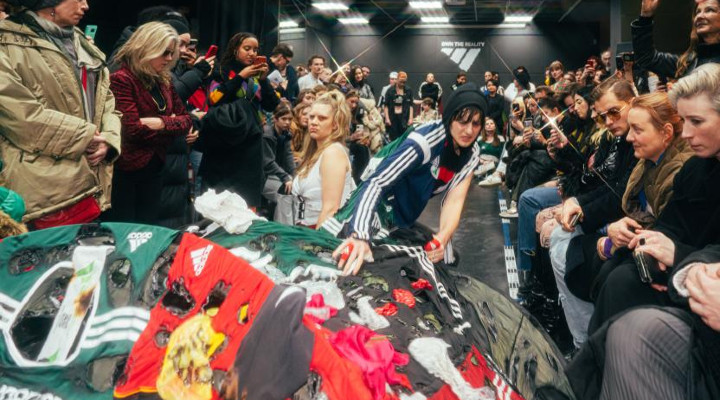Lately, it seems that Adidas has been in the headlines for all the wrong reasons. First, there was the furore around Kayne West and his anti-semitic rants, which forced the brand to sever ties, but only after public pressure made it clear there was no other choice. Then, there was the spoof press release written by an activist organisation dubbed The Yes Men, which claimed that Adidas had appointed a former Cambodian union leader as its new co-CEO, duping some reputable outlets, such as Th
The Australian Financial Review, into running a story on the fake news.
The real thrust of the campaign, which included a fake fashion show at Berlin Fashion Week, was to highlight the reality of working conditions in the Southeast Asian factories where Adidas’ clothes are made.
As reported by The Guardian, the fashion show involved bruised and bloodied models stumbling along the catwalk in garments that had supposedly been pre-worn by factory workers. The audience reportedly seemed to accept the collection as genuine.
Adidas denied the fake press release soon after it was released, but it had already been picked up by a host of news sites.
In the wake of this, The Guardian reported that there was industrial action at the factories of some of Adidas’ suppliers in Cambodia last summer, and unions said there was a rise in targeted sackings of union leaders during the pandemic.
They claim that more than 30,000 workers in eight factories that produce Adidas apparel are owed $11.7 million in wages.
We reached out to two experts to dissect this media fiasco and explore the bigger picture for brands, retailers and marketers in this day and age of misinformation. Some of their observations certainly give one a lot of food for thought.
Experts weigh in
“It was a smart move on the part of the Yes Men. But for Adidas to actually sit up and take serious notice, they need to achieve more than a few articles,” Phoebe Netto, managing director of Pure Public Relations, told Inside Retail.
Phoebe Netto, managing director of Pure Public Relations
Netto went on to say that the only question Adidas cares about is ‘are people going to stop buying our brand because of this?’. She said that if the result is merely a few news articles, it’s not going to have much of an effect.
“To really make some noise, the Yes Men need to have this all over social media, they need to have influencers talking about it, they need to be tagging people, and hitting it really hard on social media,” she added.
As a result, the media coverage would need to be persistent and of a quantity that sees Adidas bombarded with requests for comment.
In reality, she said the right thing for Adidas would be to win over people by making an industry-leading change, but this would be highly unlikely, given the brand’s past actions.
The greenwashing factor
Yes Men’s co-founder Igor Vamos, who operates under the alias Mike Bannano, alleged that the Adidas brand is a ‘master of greenwashing’. According to Netto, Vamos has a point.
She said that In 2022, the French advertising watchdog ARPP and the Advertising Ethics Jury (AEJ), found that an Adidas ad for ‘50 per cent recycled’ Stan Smith sneakers disregarded ARPP rules, which require advertising messages to be accurate and presented in a non-misleading way.
“The 50 per cent recycled claim was just about the upper of the sneaker, not the sneaker as a whole, and was therefore misleading. Also in 2022, Adidas made headlines when Channel 4’s Dispatches found its ‘ocean plastic’ trainers were made from throwaway bottles given out at a luxury hotel,” she added.
The big picture
Dan Ratner, managing director of Uberbrand, a branding and communications agency, feels that this whole episode was not so much about chaos as it was about developing conversations and content.
Dan Ratner, managing director of Uberbrand
“Adidas has a quasi-responsibility to reflect the culture it has created through its products and it has to be open to criticism from brand stakeholders, i.e. the public. This is an important issue for Adidas to address, done beautifully by the hijackers,” he noted.
On greenwashing, Ratner highlighted an obvious point. “Which corporation isn’t greenwashing? With a lot of these companies, the left hand doesn’t know what the right hand is doing, the left hand doesn’t even know there is a right hand,” he stated.
He feels that many fashion brands have sold their uniqueness to become accessible and therefore mediocre, and environmentally unfriendly by adhering to ‘fast fashion’.
Consumers, in his opinion, are also finding it hard to give up on their addiction to fast fashion so they are inadvertently going along with the greenwashing. He feels if consumers individualise their fashion choices, brands will have no choice but to accommodate this.
“Another key point is that the continued high cost of living may force fashionistas to forgo fast fashion anyway and make do with their current wardrobe for longer,” he observed.
Ultimately, Ratner is of the opinion that ‘all media can be good media’.
“If Adidas can hear what is being said, and hijack the hijackers by taking charge of the story, that will be a lesson for other brands,” he stressed.
The moral of the story is that “don’t fight the crisis or issue, roll with the punches instead.”
Ratner thinks that Adidas’ CEO, Bjorn Gulden, actually has an opportunity to own the conversation around change stemming from the event.

